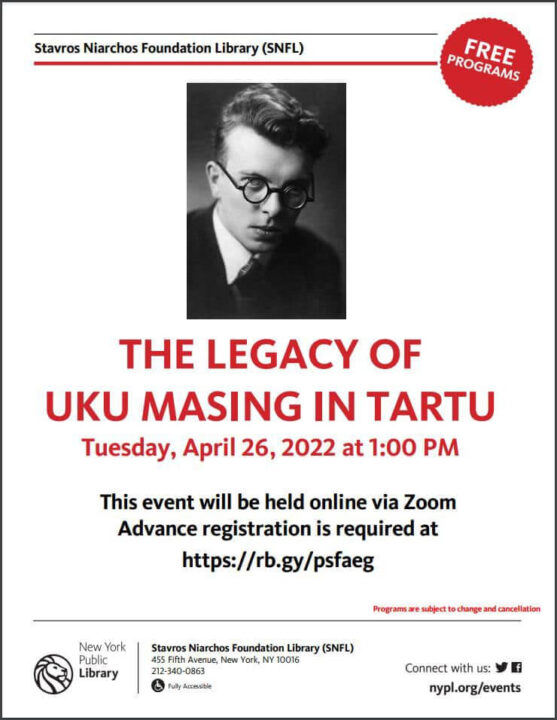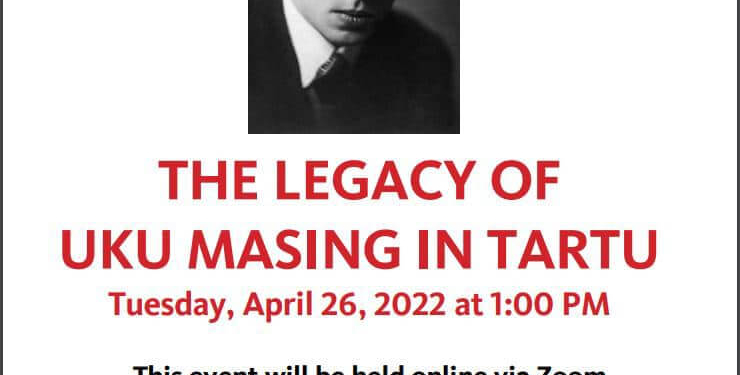
Join us online for a celebration of the life achievements of a key literary and academic figure in modern Estonia, Uku Masing.
The panel discussion with literary and musical interludes will include the following participants: Külliki Kuusk, Indrek Peedu, Lauri Sommer and Ülo Valk. The celebration will also take us to memorable places in Tartu, connected to the cultural heritage and legacy of this unique man and his city.
Uku Masing (1909 – 1985) was an Estonian poet, theologian, historian of religion, folklore specialist and philologist. His extraordinary intellectual powers, broad grasp and charisma have made him a mythical figure in Estonian literary and humanitarian circles. A gifted polyglot, he was able to speak four languages by the end of secondary school and forty by the end of his life.
A graduate of theology from the University of Tartu, Masing dedicated his life’s work to his alma mater, first as a postgraduate student and then as a professor of comparative religion, Old Testament and Semitic languages studies. In 1935, Masing published Neemed vihmade lahte (‘Headlands in the Gulf of Rains’), which became one of the influential pieces of that period. After the June 1940 coup, the Faculty of Religion at the university was closed. It was reopened during the German occupation, but from 1942, because of his controversial views of the occupiers, Masing was forced to give up his university job, and earned his living with occasional work, mostly translation and writing.
During WWII, Masing, at a great risk to himself, hid one of his students, Isidor Levin, from the Nazi authorities, ultimately, saving the student’s life. For that heroic deed, Uku Masing was honored as the Righteous Among the Nations by Yad Vashem in Israel.
During the Soviet occupation, Uku Masing became persona non grata in the eyes of the authorities. From 1946 to 1964 he worked as the scientific secretary to the Consistory of the Estonian Evangelical Lutheran Church and a lecturer at the Theological Institute. To a small extent Masing published articles in the journal Communio Viatorum of the Faculty of Religion at the University of Prague, and in Estonian publications. Only five collections of Masing’s voluminous poetic work were published abroad in his lifetime (in Italy, Sweden and Canada).
Essentially Uku and Eha Masing lived until his death on Eha’s salary. All of Uku Masing’s academic and creative work during the Soviet period passed in internal exile in Tartu. He translated, wrote collections of poetry and a large amount of research work on theology, religious history, folklore studies and other fields, without any real hope of publishing them. Nevertheless Uku Masing had a great influence on Estonian intellectual life. Many of Masing’s written works circulated widely as samizdat.
As a spiritual teacher, Masing achieved cultlike status. Uku Masing carried especially great authority among the generation of young poets and humanitarians of the sixties.
Since the 1990’s, Masing’s legacy of manuscripts has been administered by the Uku Masing Governing Board and published by the Ilmamaa publishing house. Many works have not appeared to this day, however.
ABOUT THE PARTICIPANTS
Külliki Kuusk is a researcher at the Estonian Literary Museum. She has written extensively on the poetics of Uku Masing. She is also a member of the Collegium of Uku Masing, the trustees board maintaining Masing’s legacy.
Indrek Peedu is a lecturer and a research fellow at the School of Theology and Religious Studies at the University of Tartu. Over the years, he has taught a variety of courses on the history, theory and methodology of the study of religion at the University. His field of research has two main directions. Firstly, he focuses on the analysis of methodological issues in the study of religion, particularly in relation to epistemological problems and the evolutionary and cognitive study of religion. Secondly, he is studying the intellectual history of social, cultural and religious evolutionism, primarily dealing with materials from the first half of the 20th century in Estonia.
Lauri Sommer is an award-winning Estonian writer, literary scholar, translator and a musician. In the 1990s, he was a member of the literary group Erakkond. Mixing fact and fiction, he has focused on the life of Uku Masing on several occasions, including in his latest book, The Lights of Toome Hill. Sommer has also released several music albums, mostly under the moniker Kago. In 2021, he was awarded the Order of the White Star, V class.
Ülo Valk is a Professor of Estonian and Comparative Folklore, University of Tartu. His publications include The Black Gentleman: Manifestations of the Devil in Estonian Folk Religion, and two edited volumes: Vernacular Religion in Everyday Life, and Storied and Supernatural Places. During 2003-2004 he was a Fulbright Fellow at the Center for Folklore and Ethnography, University of Pennsylvania. During 2005-2009 he served as president of the International Society for Folk Narrative Research (ISFNR). His recent research has focused on belief narratives, placelore, folklore in the social context, and vernacular Hinduism.
NY Public Library











